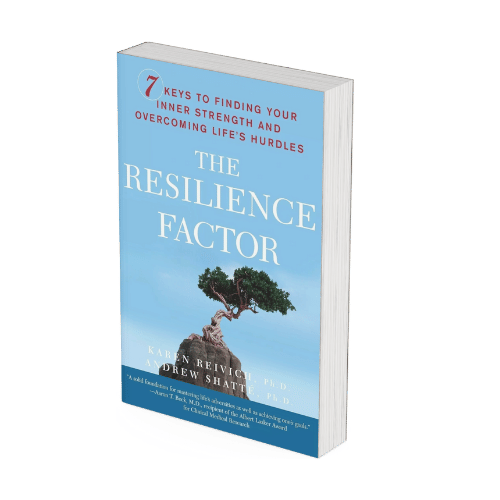The Resilience Factor
by Andrew Shatte and Karen Reivich
The Authors: Andrew Shatte and Karen Reivich
Andrew Shatte, Ph.D., is a leading expert in resilience and a research professor at the University of Arizona. He has devoted his career to understanding how individuals and organisations can build mental toughness and bounce back from adversity. His co-author, Karen Reivich, Ph.D., is a renowned psychologist at the University of Pennsylvania and an expert in positive psychology. Together, they combine decades of research in cognitive-behavioural therapy and resilience to develop practical, science-backed strategies for cultivating resilience in everyday life. Their work draws on the fields of psychology, neuroscience, and behavioural science, offering readers actionable insights grounded in scientific evidence.
Summary of “The Resilience Factor”
The Resilience Factor: 7 Keys to Finding Your Inner Strength and Overcoming Life’s Hurdles by Andrew Shatte and Karen Reivich is a comprehensive guide that explores the science of resilience and provides readers with practical tools to enhance their capacity to handle life’s challenges. The authors draw on years of research in positive psychology and cognitive-behavioural therapy to present a framework for understanding and building resilience.
The book is structured around seven key factors, each representing a critical component of resilience. These factors are:
Emotional Regulation
Managing emotions effectively, especially in stressful situations, is foundational to resilience. The authors provide techniques for recognising and managing emotional responses to adversity.
Impulse Control
Learning to pause and consider the consequences before reacting is crucial for making sound decisions, particularly under pressure. The book offers strategies to help readers develop greater self-control and avoid impulsive actions that could exacerbate challenges.
Optimism
Shatte and Reivich highlight the importance of maintaining a positive outlook, even in difficult times. They discuss the role of optimism in resilience and provide exercises to help readers cultivate a more hopeful mindset.
Causal Analysis
Understanding the root causes of problems is essential for developing effective solutions. The book introduces techniques for identifying and analysing the factors contributing to adversity, enabling readers to address challenges more effectively.
Empathy
Understanding and connecting with others’ emotions is a critical component of resilience. The authors provide guidance on how to build empathy and foster stronger relationships, which are crucial for support during tough times.
Self-Efficacy
Believing in one’s ability to influence outcomes is vital for resilience. The book discusses ways to build self-confidence and develop a sense of agency in the face of adversity.
Reaching Out
The final factor focuses on the importance of seeking help and expanding one’s support network. The authors emphasise the value of reaching out to others and fostering a sense of community to build resilience.
Each chapter delves into one of these seven factors, offering practical exercises, real-life examples, and evidence-based techniques for building resilience. The book also includes a “Resilience Quotient Test,” which helps readers assess their current level of resilience and identify areas for improvement. Shatte and Reivich’s approach is both scientific and accessible, making The Resilience Factor a valuable resource for anyone looking to strengthen their ability to navigate life’s challenges.
My Thoughts on “The Resilience Factor”
Reading The Resilience Factor reminded me how vital resilience is both during crises and as a daily practice. Shatte and Reivich skilfully break down complex resilience science into clear, actionable steps that align well with my therapeutic approach. Their focus on emotional regulation, causal analysis, self-efficacy, and optimism offers practical tools to help clients manage adversity effectively. The book’s emphasis on building strong support networks also resonates with my belief in the power of community for fostering resilience. Overall, it is a valuable resource for therapists, coaches, and anyone seeking to strengthen their ability to navigate life’s challenges.
I Encourage Clients and Colleagues to Incorporate the Teachings from “The Resilience Factor”
Emotional Regulation
Managing emotions effectively, especially in stressful situations, is foundational to resilience. The authors provide techniques for recognising and managing emotional responses to adversity.
Impulse Control
Learning to pause and consider the consequences before reacting is crucial for making sound decisions, particularly under pressure. The book offers strategies to help readers develop greater self-control and avoid impulsive actions that could exacerbate challenges.
Optimism
Shatte and Reivich highlight the importance of maintaining a positive outlook, even in difficult times. They discuss the role of optimism in resilience and provide exercises to help readers cultivate a more hopeful mindset.
Causal Analysis
Understanding the root causes of problems is essential for developing effective solutions. The book introduces techniques for identifying and analysing the factors contributing to adversity, enabling readers to address challenges more effectively.
Empathy
Understanding and connecting with others’ emotions is a critical component of resilience. The authors provide guidance on how to build empathy and foster stronger relationships, which are crucial for support during tough times.
Self-Efficacy
Believing in one’s ability to influence outcomes is vital for resilience. The book discusses ways to build self-confidence and develop a sense of agency in the face of adversity.
Reaching Out
The final factor focuses on the importance of seeking help and expanding one’s support network. The authors emphasise the value of reaching out to others and fostering a sense of community to build resilience.
In Summary
The Resilience Factor: 7 Keys to Finding Your Inner Strength and Overcoming Life’s Hurdles by Andrew Shatte and Karen Reivich is a comprehensive and practical guide to building resilience. The authors provide a science-based framework that is accessible and applicable to a wide range of challenges, making this book a valuable resource for anyone looking to enhance their mental toughness and ability to overcome adversity.
The Resilience Factor
by Andrew Shatte and Karen Reivich
The Authors: Andrew Shatte and Karen Reivich
Andrew Shatte, Ph.D., is a leading expert in resilience and a research professor at the University of Arizona. He has devoted his career to understanding how individuals and organisations can build mental toughness and bounce back from adversity. His co-author, Karen Reivich, Ph.D., is a renowned psychologist at the University of Pennsylvania and an expert in positive psychology. Together, they combine decades of research in cognitive-behavioural therapy and resilience to develop practical, science-backed strategies for cultivating resilience in everyday life. Their work draws on the fields of psychology, neuroscience, and behavioural science, offering readers actionable insights grounded in scientific evidence.
Summary of “The Resilience Factor”
The book is structured around seven key factors, each representing a critical component of resilience. These factors are:
Emotional Regulation
Managing emotions effectively, especially in stressful situations, is foundational to resilience. The authors provide techniques for recognising and managing emotional responses to adversity.
Impulse Control
Learning to pause and consider the consequences before reacting is crucial for making sound decisions, particularly under pressure. The book offers strategies to help readers develop greater self-control and avoid impulsive actions that could exacerbate challenges.
Optimism
Shatte and Reivich highlight the importance of maintaining a positive outlook, even in difficult times. They discuss the role of optimism in resilience and provide exercises to help readers cultivate a more hopeful mindset.
Causal Analysis
Understanding the root causes of problems is essential for developing effective solutions. The book introduces techniques for identifying and analysing the factors contributing to adversity, enabling readers to address challenges more effectively.
Empathy
Understanding and connecting with others’ emotions is a critical component of resilience. The authors provide guidance on how to build empathy and foster stronger relationships, which are crucial for support during tough times.
Self-Efficacy
Believing in one’s ability to influence outcomes is vital for resilience. The book discusses ways to build self-confidence and develop a sense of agency in the face of adversity.
Reaching Out
The final factor focuses on the importance of seeking help and expanding one’s support network. The authors emphasise the value of reaching out to others and fostering a sense of community to build resilience.
Building Resilience Step by Step
Each chapter explores one of the seven resilience factors with exercises and real-life examples. The book includes a “Resilience Quotient Test” to assess and improve resilience levels. Shatte and Reivich combine science and accessibility, making this an invaluable self-help resource.
My Thoughts on “The Resilience Factor”
Reading The Resilience Factor reminded me how vital resilience is both during crises and as a daily practice. Shatte and Reivich skilfully break down complex resilience science into clear, actionable steps that align well with my therapeutic approach. Their focus on emotional regulation, causal analysis, self-efficacy, and optimism offers practical tools to help clients manage adversity effectively. The book’s emphasis on building strong support networks also resonates with my belief in the power of community for fostering resilience. Overall, it is a valuable resource for therapists, coaches, and anyone seeking to strengthen their ability to navigate life’s challenges.
I Encourage Clients and Colleagues to Incorporate the Teachings from “The Resilience Factor”:
Focus on Emotional Regulation
Learn techniques to manage emotions effectively, particularly in stressful situations, to maintain clarity and make better decisions.
Develop Impulse Control
Practice pausing before reacting to ensure thoughtful and constructive responses.
Cultivate Optimism
To foster resilience and motivation, work on maintaining a positive outlook, even in challenging times.
Engage in Causal Analysis
Encourage a deeper exploration of the root causes of challenges to develop more effective solutions.
Build Empathy
Foster stronger relationships by understanding and connecting with others’ emotions, which can provide crucial support during tough times.
Strengthen Self-Efficacy
Help clients build confidence in their ability to influence outcomes and navigate adversity.
Reach Out and Build Support Networks
Emphasise the importance of seeking help and creating a sense of community to bolster resilience.
In Summary
The Resilience Factor: 7 Keys to Finding Your Inner Strength and Overcoming Life’s Hurdles by Andrew Shatte and Karen Reivich is a comprehensive and practical guide to building resilience. The authors provide a science-based framework that is accessible and applicable to a wide range of challenges, making this book a valuable resource for anyone looking to enhance their mental toughness and ability to overcome adversity.
“The only way to make sense out of change is to plunge into it, move with it, and join the dance.”
Recent Thoughts
Stay with the Feeling
I see it every week in the clinic, and I recognise it in myself. The moment a feeling squeezes, we reach for the
When Your Feelings Flash Like a Dashboard Light
Understanding Your Inner Emotional Compass I still remember the first time the oil light flashed during a late-night drive from a workshop, tired




